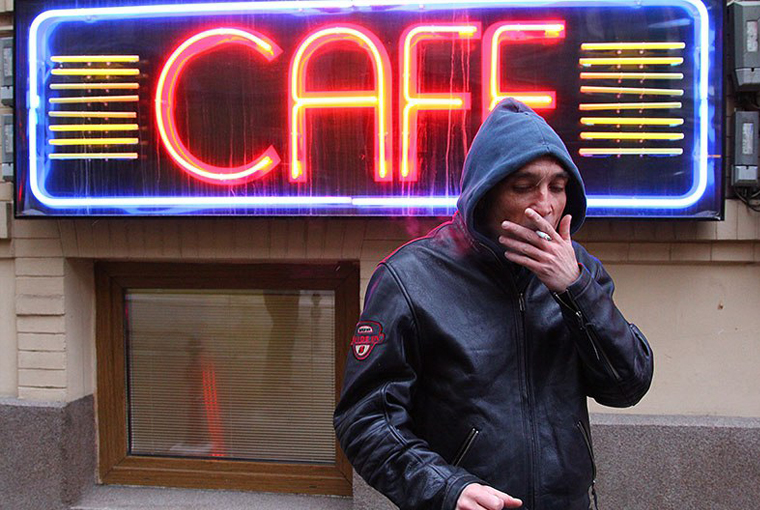
Marian Crişan’s second feature film Rocker makes another case for Romanian loserism. The movie revolves around the relationship between Victor (Dan Chiorean), an old rocker, and his adult son Dinte (Alin State). Dinte, perhaps to fulfill the dreams of his father, is pursuing a professional career as a rocker. But a drab reality is working against their dreams of underdog stardom. Victor has no money, and problems with his girlfriend. His son doesn’t have the right equipment for his sound, and not enough drugs for inspiration. Although Crişan tries to keep the story on a personal level, the movie has not more to offer than a variety on the generation conflict that started the Romanian New Wave (most strikingly in Puiu’s Stuff and Dough, and Cigarettes and Coffee). Here, old parental figures with Communist values lose track of a reality that has turned its back on them, while the younger generation’s pursue of Capitalism leaves them just as lost.
So too, Victor’s loserism is defined by his efforts to keep a harmonious relationship with his son, his girlfriend, and her son. He’s a family guy of the Communist type who believes that everything is cool as long as everyone works together. Which nobody does. The local drug dealer wants money, not a conversation about how to get along. His son wants drugs, not moral support. His girlfriend wants stability, not love. And so on and so forth. Perhaps the difference is best expressed in Victor’s and Dinte’s clashing approach to music. For Victor Rock is a collective endeavor. It is, above all, a group experience with no use other than the experience itself. Victor doesn’t seem to have a clue about the marketing aspects of music. The way he films the band has embarrassing similarities to a father capturing family souvenirs. In this mindset, the idea of a video promoting a band on YouTube sounds like science-fiction. His son, on the other hand, wants the experience to express himself. He has weird aesthetic ideals about how to distinguish himself from others. In this world, only individualism counts.
Capitalist metaphors do not lack. Throughout the whole movie, Victor is hopelessly trying to sell a pair of stolen Skiers. But nobody is interested, so that by the end of the movie, the money Victor spends on gas driving them around to find potential buyers probably exceeds the worth of the Skiers. Again, there is an awkward backwardness in all of this. Why not make an Ad on the internet? But then again, for Victor, making money, as everything else, is about the people.
To Crişan’s credit, he seems to be aware of the fact that his movie doesn’t have a lot of unheard sound to offer. In a moment of self-relfexivity, Dinte tells his father to shoot his band in long shots, and from a distance “like those new Romanian films.” This is funny, but Crişan is undecided whether to mock or follow this dictum himself. Character-wise everything in the movie feels like a variation on a theme. Image-wise, are the long takes of Victor walking over fields, through streets, and sitting at his kitchen table meant to be ironic?
Of course, we Capitalists expect art to change at a pace that is more rapid than the changes that occur in society. We expect to be fed with new images, when the reality that artists have the need to show us is still the same. In a way, we are much like the absent crowd both Victor and his son are trying to please. Instead of looking at what art has to say, we care more about the way in which it is presented. This is the most depressing aspect of his movie, a subtle one, but one worth showing.




Leave a Comment